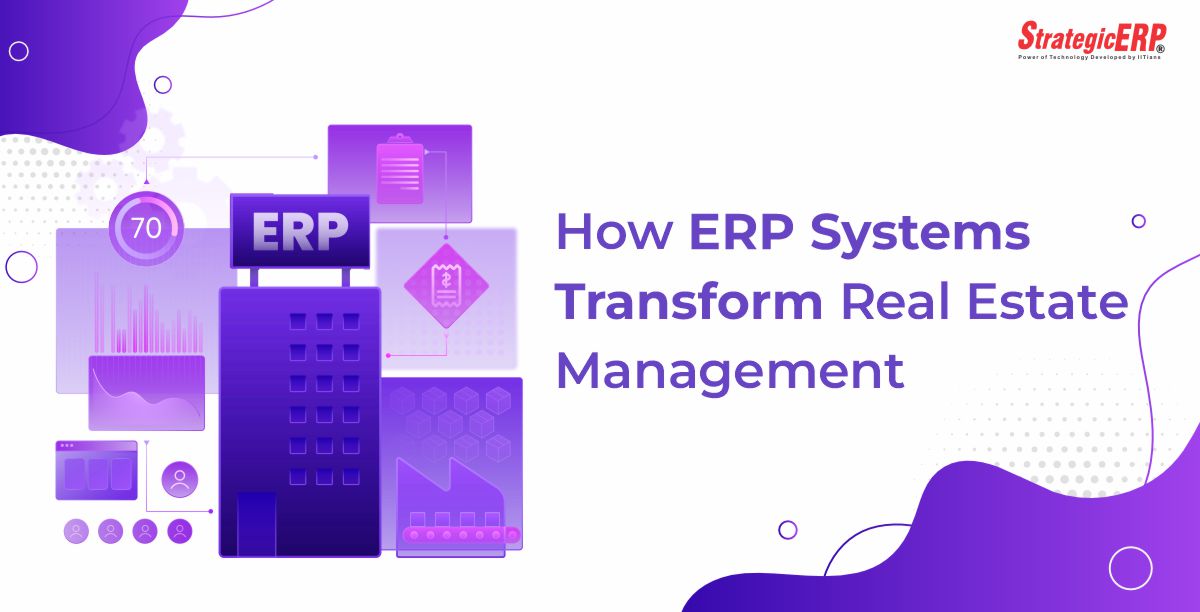How ERP Systems Transform Real Estate Management
Category : Real Estate Sector
Blog posted by : Admin / 29 Jun, 2024
Juggling property listings, client interactions, financial reports, and regulatory compliance can be a nightmare for real estate managers. Moreover, traditional methods, reliant on spreadsheets and siloed data, often lead to inefficiencies, errors, and missed opportunities.
Instead, imagine a single platform seamlessly integrating all aspects of your real estate business. By centralising all aspects of your business onto a single platform, real estate ERP software streamlines processes automates tasks, and delivers real-time data at your fingertips. This translates to increased efficiency, improved accuracy, and stronger financial control.
In this blog, we go deeper into the importance of integrating an ERP system into your real estate businesses for maximum efficiency and profitability. Read along to learn more about ERP features and benefits.
Importance of Real Estate Management
Real estate management is a comprehensive solution for property owners, handling everything from daily operations to strategic long-term planning. Real estate management companies act as intermediaries between property owners and tenants, overseeing crucial aspects such as tenant acquisition and retention, financial management, and property maintenance.
By professionally managing these elements, they not only ensure smooth day-to-day operations but also work towards enhancing property value over time. This comprehensive approach allows property owners to maximise their returns on investment while minimising the time and effort they need to invest personally.
Understanding ERP Systems
Enterprise Resource Planning (ERP) systems integrate and streamline various organisational business processes. In the real estate industry, ERP systems are crucial in managing complex workflows, from project planning and regulatory approvals to financial management and customer relations. These systems collect, organise, and analyse data in real-time, providing valuable insights that enable businesses to make better decisions and operate more efficiently.
Enhancing Project Management in Real Estate

As the complexity of real estate projects continues to grow, effective project management becomes increasingly vital. It ensures that projects are wrapped up on time, within budget, and to the required quality standards. Here are three key areas where project management can be enhanced in the real estate sector:
Streamlined Project Planning
Real estate professionals can create more comprehensive and realistic project plans by utilising advanced project management tools and methodologies. These plans should incorporate detailed timelines, resource allocation, budget forecasts, and risk assessments.
Real-Time Progress Tracking
Implementing sophisticated project management software with real-time tracking capabilities can significantly enhance project oversight. This allows project managers to quickly identify deviations from the plan in terms of timeline, budget, or quality standards.
Enhanced Collaboration and Communication
Implementing robust communication and collaboration tools can significantly improve project efficiency and outcomes. These tools can facilitate instant information sharing, document management, and task assignment across the project team. Also, enhanced collaboration leads to better coordination, reduced misunderstandings, and more efficient problem-solving.
Key Benefits of ERP Systems in Real Estate Management
Integrating ERP software into real estate management provides various benefits, eventually increasing operational efficiency and financial success. Some of the primary benefits of ERP are:
Streamlined Operations
ERP for real estate consolidates various business processes into a single platform, removing the need for multiple software solutions. This integration streamlines day-to-day operations, reducing manual data entry and minimising errors. Everything is managed in one place, from property listings to maintenance requests, allowing you and your team to work more efficiently.
Improved Financial Management
ERP for real estate provides a comprehensive view of financial operations, from rent collection to expense tracking. This centralised approach to financial management enables better cash flow monitoring, simplified budgeting, and more accurate forecasting. Automated billing and payment reminders reduce late payments, while real-time financial reporting gives managers instant insights into the company’s financial health.
Enhanced Reporting and Analytics
One of the most important advantages of ERP systems for real estate is their ability to create detailed reports and analytics. These insights go beyond basic financial statements, offering in-depth analysis of property performance, market trends, and operational efficiency. Real estate managers can quickly identify underperforming assets, track key performance indicators (KPIs), and make data-driven decisions to optimise their portfolios.
Better Tenant and Lease Management
ERP for real estate revolutionises tenant and lease management by centralising all related information. From lease agreements to maintenance requests, everything is stored in one easily accessible location. This centralisation improves tenant communication, streamlines the leasing process, and helps property managers stay on top of important dates like lease renewals.
Functionalities of ERP Systems in Real Estate
Now that you understand the advantages of ERP for your Real Estate business, you must also choose the correct ERP software for real estate companies. Here is a checklist of the features to consider while implementing software for your organisation.
Property Management
Property management functionality of a real estate ERP software system typically includes features for tracking property details, managing tenant information, and monitoring occupancy rates. This comprehensive approach allows real estate professionals to efficiently manage diverse portfolios, from residential apartments to commercial complexes, all within a single platform.
StrategicERP’s property management module takes this functionality a step further. It offers a user-friendly interface that simplifies complex property management tasks. With features like automated rent escalation, customisable reporting, and integration with accounting systems, StrategicERP enables real estate businesses to streamline their operations and make data-driven decisions.
Facility Management
Facility management functionality in ERP for real estate focuses on maintaining properties' physical assets and infrastructure. This includes managing common areas, utilities, and building systems. Also, good facility management modules offer tools for scheduling regular inspections, tracking energy consumption, and managing service contracts. They often include features for space planning, asset tracking, and compliance management to ensure properties meet all relevant regulations and standards.
Lease Administration
Effective lease management is one of the most difficult but important functions of a real estate company. A real estate ERP software system automates and simplifies these procedures, reducing the administrative strain of human management. Property managers can easily centralise their lease information and receive rapid access to tenant details, lease terms, and payment history with a few clicks. This increases operational efficiency while reducing the chance of contractual conflicts and errors.
Maintenance Management
ERP for real estate typically includes robust maintenance management modules that allow for creating and tracking work orders, scheduling preventive maintenance, and managing maintenance staff and contractors. These systems often feature mobile capabilities, enabling maintenance teams to receive and update work orders from the field in real-time.
Moreover, advanced maintenance management functionalities might include inventory management for spare parts and automated maintenance scheduling based on equipment usage to identify recurring issues or inefficiencies in maintenance processes.
Implementing ERP Systems in Real Estate
Traditionally, real estate data was siloed in separate systems, making it difficult to get a holistic view of operations. However, implementing a real estate ERP software system has revolutionised how businesses manage their processes, leading to increased efficiency, better decision-making, and improved profitability. Here is how you can implement it in your business, too:
Steps to Successful Implementation
Implementing an ERP system in real estate requires careful planning and execution. Begin by forming a dedicated implementation team that includes representatives from all departments. This team should conduct a thorough analysis of your current processes to recognise areas for improvement. With this information, develop a clear implementation strategy with defined goals and timelines.
Choosing the Right ERP System
Now, look for a system that specifically caters to the real estate industry, offering modules for property management, financial accounting, and customer relationship management. Also, when evaluating options, consider factors such as:
-
Scalability
-
Customisation options
-
Integration capabilities with other software you use
Also, evaluate the vendor’s reputation, support services, and long-term viability to ensure you’re partnering with a reliable provider.
Integration with Existing Systems
Start by mapping your current software and data sources to understand your technological landscape. Then, work closely with your ERP vendor to develop a comprehensive integration plan that may involve APIs, custom connectors, or middleware solutions. Also, ensure that data migration is handled carefully and thoroughly validated to maintain data integrity throughout the process.
Training and Support
Create a comprehensive training program that covers all elements of the new system, tailored to different user roles within your organisation. For this, you can consider a mix of training methods, including hands-on workshops, online tutorials, and user manuals to cater to different learning styles.
Conclusion
As real estate organisations grow, handling additional properties, transactions, and customer data will become more difficult. A scalable ERP system allows firms to grow their operations without incurring excessive increases in overhead or resources. Small business ERP solutions also evolve with the firm, seamlessly accommodating additional users, properties, and more complicated business models.
And if you’re looking to transform your real estate management practices, StrategicERP offers a robust, industry-specific solution tailored to meet the specific challenges of the real estate sector. With its cloud-based platform, mobile accessibility, and modules covering every aspect of real estate operations, StrategicERP can help your business achieve new levels of efficiency and success. Don’t let outdated systems hold your business back. Book a free demo now!
Frequently Asked Questions (FAQs)
What steps are involved in implementing an ERP system in a real estate company?
Implementing an ERP system in a real estate company involves several steps: assessing business needs, selecting the appropriate ERP software, and planning the implementation process. This is followed by data migration, system customisation, user training, and regular monitoring to ensure the system meets the company’s objectives.
How do ERP systems enhance reporting and analytics in real estate?
ERP systems enhance reporting and analytics in real estate by consolidating data from various departments into a single platform, providing real-time insights. This enables detailed, accurate reports and advanced analytics, facilitating better decision-making and strategic planning.
How do ERP systems integrate with existing real estate management software?
ERP systems integrate with existing real estate management software through APIs and middleware, enabling seamless data exchange. This integration ensures that the systems work harmoniously, improving data accuracy and operational efficiency without disrupting existing workflows.
Can ERP systems be customised for specific real estate needs?
Yes, ERP systems can be customised to meet specific real estate needs by configuring modules to address unique business processes, regulatory requirements, and reporting needs. Customisation ensures that the ERP system aligns perfectly with the company’s operational goals and enhances overall productivity.









